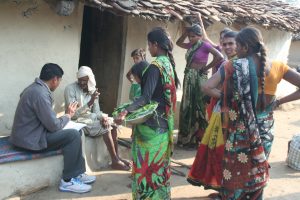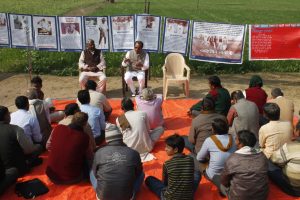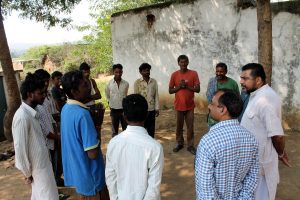
One of the key components that contributed to the success of the Self Reliance Campaign conducted by Deendayal Research Institute (DRI) in 500 villages that lie within a radius of 50 km around Chitrakoot, was the Samaj Shilpi Dampati (SSD). The Samaj Shilpi Dampati are a graduate couple that live and work in the village itself, thereby gaining the trust of the villagers. They are thus able to guide and motivate the villages in implementing all the necessary elements to make the village self-reliant. All interventions by the Institute during the campaign were carried out through the SSDs. The SSDs were also the key element is ensuring the working of the various committees that were formed to ensure the sustainability of the village’s self reliance. The SSDs were withdrawn from the villages after they gained self-reliant status; and the SSDs only played a superficial monitoring role post their withdrawal. The responsibility for the continuation of the schemes and processes initiated in the village, rested with the Village Committees.

During the survey conducted in 2016-17 to audit the results fo the Self Reliance Campaign, it was found that this lack of guidance has caused a decline in communication between the Institute and the village. This led to a decline in the work of most of the Committees that were formed, and also in a decline in the implementation of new schemes and techniques that the villagers could utilise, as there was a lack of knowledge of the schemes and its benefits. There was no mechanism to ensure updates, except for self-motivation, and this appeared to be absent.
To address this lacuna in the sustainability of the Self Reliance Model, the Institute has envisioned enrolling the help of Associate Volunteers who would help in disseminating knowledge to the villages and communicate their problems to the Institute in real time.

The need for five separate Volunteers – Gram Sahyogi Karyakartas (GSKs) in each village have been identified. They are:
- Gram Sanyojak Dampati (GSD)
- Krishi Gyan Doot (KGD)
- Gramin Swasthya Karyakarta (GSK)
- Pashu Swasthya Karyakarta (PSK)
- Rojgar Prerak (RP)
Depending on the type of responsibility given, the Karyakartas will be guided by different specialists from the Institute. The Karyakartas would also join the Village Committees and form their backbone ensuring a quorum for continuing their role and strengthening them.
Details of the Gram Sahyogi Karyakartas are as follows:
- Gram Sanyojak Dampati (Village Co-Ordinator Couple)
Concept
The Samaj Shilpi Dampati concept, initiated by Rashtrarishi Nanaji Deshmukh, was a unique experiment in the the implementation of the schemes for the holistic development of villages in India. Their role in the success of the Self Reliance Campaign in Chitrakoot validates their role in rural development. However, as the SSDs are not local, they would eventually have to be withdrawn. To ensure continuity of their work, after the intial hurdles in trust and implementation have been overcome, the use of a village couple as a Gram Sanjoyak Dampati, who could take over their role in the village has been envisaged.
Selection Criteria
- No age limit.
- Education not a criterion.
- Interest in Social and village development activities.
- Keeps away from Party politics.
- Trusted by the villagers.
Activities
- To update village action plans with the help of village development committees and monitor progress and implementation of action plan. Coordinate with Institute regarding needs and problems.
- To participate in all village group activities and become a member of all Village Committees.
- To maintain coordination with the members of committees and all village volunteers i.e. Krishi Gyan Doot, Pashu Swasthya Karyakarta, Rojgar Prerak, and Swasthaya Karyakarta, Panchayat and Institute.
- To review village progress and information every 6 months.
- To participate in the village’s happy and sorrowful moments, and help resolve disputes.
- To be aware of government and non-government schemes.
- School dropouts and Adult Illiteracy.
- To actively participate in all the programs organized by DRI.
Methods of Training
- 3 day Intensive Training at DRI Centre. Full briefing about all DRI activities so that appropriate activities can be introduced to the villagers who need them.
- Updates through Whatsapp Group.
- Use of Video Clips for easy teaching.
- Participation in short duration Government & Non-government Training Programs.
Coordination
- The Gram Sanyojak Dampati will work under the guidance of a Samaj Shilpi Dampati. Each Samaj Shilpi Dampati will be responsible for 5 clusters. As each village/hamlet will have a Gram Sanyojak Dampati, and there are 5 villages/hamlet per cluster, each Samaj Shilpi will mentor 25 Gram Sanyojak Dampatis.
- The Samaj Shilpi Dampati will spend at least half a day with each Gram Sanyojak Dampati twice a month, to guide, motivate and support them. Also meeting with all Gram Sahyogi Karyakartas of each cluster once a month.
- Resource Centre will collate all data received from the Gram Sanyojak Dampatis to monitor where further inputs and trainings are required. Will also be responsible for updating Database.
- Krishi Gyan Doot (Farm Knowledge Ambassador)
Concept
As the Krishi Vigyan Kendra’s (KVK) responsibilities extend through a whole district, their limited human resources do no allow them to guide the villages to the extent that is often required. To overcome this manpower shortage, the concept of a Krishi Gyan Doot (KGD) has been introduced.
Selection Criteria
- Active and Progressive Farmer.
- Education not a criterion.
- Interest in Social activities.
- Uses a mobile.
- No age limit.
- Keep away from Party politics.
Activities
- Provide voluntary service in the planning, management and technological support of good agricultural practices to his fellow farmers.
- Facilitate timely flow of information from the KVK to the farmers.
- Feedback of the technological input from the farmers to the KVK.
- Understanding farmer’s problems and motivating them to change.
Methods of Training
- Intensive orientation and training course in KVK in planning, management and technological support of good agricultural practices.
- Half yearly workshop/meeting of these selected KGDs held during pre-kharif and pre-rabi season at KVK.
- Emergency need-based training camps in case of major problems.
- Literature on crop production technologies.
